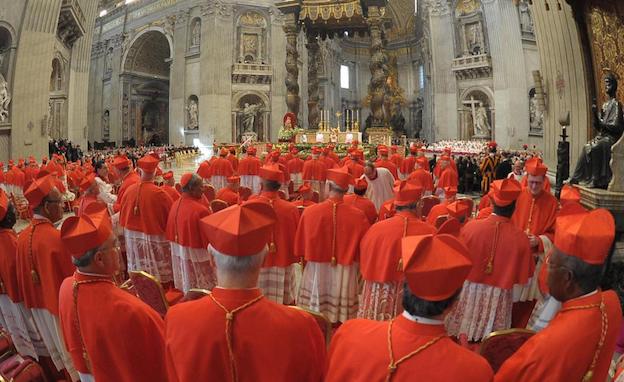I’ve been in Rome less than a day and my head is already swimming with rumors – and several indisputable facts – surrounding what might otherwise have been an ordinary weekend consistory to welcome new cardinals.
Because the pope has decided not to do that. The sequence of events is not yet clear. No one seems to know whether he decided this after he received the bombshell letter in September from the four cardinals with questions about Amoris Laetitia. Or whether the decision was more recent. But incredibly, to this observer anyway, there was no meeting with the pope scheduled for the incoming cardinals yesterday or today. The first that some of them see of him this week may be at the ceremony Saturday.
This series of columns on the consistory was planned long ago and was not intended as a commentary on the cardinals’ letter or Amoris Laetitia. But it could easily turn into one, even in an effort to understand the consistory. A local journalist told me today the pope is furious over the letter. An Italian professor adds that a high Vatican official reported the same – using a vulgar Italian equivalent for “furious,” probably best not set down in writing.
More about all this when there is more. But let’s get back to our main task.
European newspapers are making much of the fact that the august Oxford English Dictionary has just declared “post-truth” the 2016 Word of the Year. The term refers to things “relating to or denoting circumstances in which objective facts are less influential in shaping public opinion than appeals to emotion and personal belief.”
The Church, of course, has been struggling with what Joseph Ratzinger once called “the dictatorship of relativism” – to which we might add “the dictatorship of non-relativism” on matters like gay marriage and the transgendered.
Pope Francis has battled gay and gender issues – there are strong statements about them even in Amoris Laetitia. But if you were to judge solely on the basis of the list of new cardinals, it almost seems like he’s given up the fight, at least in Europe.
We mentioned yesterday how nearly half of the thirteen new voting cardinals come from small or minority Catholic nations. If you take away the three Americans – Cupich of Chicago, Tobin of Indianapolis, and Farrell (soon to be of Rome) – there are five more or less obvious choices: Carlos Osoro Sierra of Madrid, Sérgio da Rocha of Brasilia, Josef de Kesel of Mechelen-Brussels, Baltazar Enrique Porras Cardozo of Merida (Venezuela), and Carlos Aguiar Retes of Tlalneplanta (Mexico). In other words, three cardinals from national capitals and two from modest dioceses in Latin America.
De Kesel is a controversial choice because he botched the handling of several cases of priestly sexual abuse – he once had to testify because of that before the Belgian Parliament. He’s also is widely reported to be sympathetic to gay causes. A news item just released yesterday indicated that he’s been trying various means of eliminating priests and seminarians who are “too orthodox” from the archdiocese that serves the capital of the European Union.
Europeans I talked with in Rome have different readings of the large number of non-Europeans among the pope’s new cardinals. Some emphasize that Catholicism is in trouble in its ancient homeland (as if we Americans didn’t know), and even in Latin America, where Protestants of various stripes have made large inroads. Guatemala, for example, is about half Catholic, half Protestant now; massive Brazil has both the largest Catholic population in the world – and yet one-quarter of its people, and growing, are Protestants; Argentina is heavily Catholic but only 20 percent are practicing.
It’s difficult to say what is being done to counteract these trends. One way of reading the new appointments is that the Holy Father believes that the future of the Church, if present trends continue, lies with Africa and Asia. Even if that is true, however, there are places like China, India, etc. with large Catholic populations: China with at least 9 million and India with 20 million. They seem relatively neglected.
Sub-Saharan Africa, it is said, will have over a billion Catholics by 2100. But there are only two new cardinals from that region, and it’s difficult to say why the others from small countries are important to nominate now. In terms of influence, they are likely to keep the Church more traditional on social questions, but bring non-Western perspectives to questions of global politics and economics.
Ironically, while many in the United States are focused this week on the new cardinals and what they may mean for the future of the Church, in Rome, there’s been considerable interest in what’s been happening the past few days in Baltimore. The U.S. bishops have been holding their annual conference and selected a new president to replace Louisville’s Archbishop Joseph Kurtz, who just finished his three-year term.
As expected, Cardinal Daniel DiNardo – the USCCB vice-president – was chosen president, and Archbishop José Gomez, an Opus dei priest, the new vice-president. The Italians were wondering if a “Francis Effect” would emerge in America (whatever they say, Europeans believe that what happens here today will happen there before long).
Yesterday I gave an interview to Il Foglio, the most important conservative daily in Italy, urging them not to read too much into the choices – but not too little either. For now, hard as it may be for many American Catholics to believe, who feel our bishops should speak more boldly, our episcopate remains largely committed to the visions laid out by St. John Paul II and Benedict XVI, with a measured overlay of “mercy.” Even the support for immigrants and refugees is not a reaction to the pope or a coming Trump presidency, but a longstanding advocacy.
So no Francis Effect yet in America, and globally it may take a long time yet to tell what, if any, that effect might be.
















